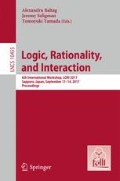Abstract
This paper puts forward a generalization of the account of pooling information – offered by standard epistemic logic – based on intersection of sets of possible worlds. Our account is based on information models for substructural logics and pooling is represented by fusion of information states. This approach yields a representation of pooling related to structured communication within groups of agents. It is shown that the generalized account avoids some problematic features of the intersection-based approach. Our main technical result is a sound and complete axiomatization of a substructural epistemic logic with an operator expressing pooling.
I. Sedlár—This work has been supported by the joint project of the German Science Foundation (DFG) and the Czech Science Foundation (GA ČR) number 16-07954J (SEGA: From shared evidence to group attitudes). The authors would like to thank the anonymous reviewers for their comments. The second author’s ORCID ID is 0000-0002-1942-7982.
Access this chapter
Tax calculation will be finalised at checkout
Purchases are for personal use only
Notes
- 1.
- 2.
For example, “A group has distributed knowledge of a fact \(\varphi \) if the knowledge of \(\varphi \) is distributed among its members, so that by pooling their knowledge together the members of the group can deduce \(\varphi \), even though it may be the case that no member of the group individually knows \(\varphi \).” [4, p. 3]. This interpretation suffers from well-known problems [5, 11, 16]; we point out some additional ones. Hence, our paper can be seen as providing an additional argument against considering the standard model to be a good model of communication-related pooling. In the future, we plan to study the “full communication principle” of [5, 11] and the dynamic approach of [16] in the context of our framework.
- 3.
For associativity, see also [13].
- 4.
By “information states” we mean bodies of information that might be “available to” agents, but we do not assume that every information state is an information state of an agent.
- 5.
An alternative extension of Došen’s semantics is due to Wansing [15] who adds to Došen’s models a constructive negation based on positive and negative valuation.
- 6.
The body of information x consists of information on a number of topics, including agents a and b, and how they react to receiving specific information in communication. \(f_{a*b}(x)\) is the information constituting a’s information state after receiving information from b, according to what x says about a and b.
References
van Benthem, J., Martinez, M.: The stories of logic and information. In: van Benthem, J., Adriaans, P. (eds.) Philosophy of Information, chap. 7, pp. 217–280. Elsevier (2008)
van Ditmarsch, H., Halpern, J.Y., van der Hoek, W., Kooi, B.: An introduction to logics of knowledge and belief. In: van Ditmarsch, H., Halpern, J.Y., van der Hoek, W., Kooi, B. (eds.) Handbook of Epistemic Logic, chap. 1, pp. 1–51. College Publications (2015)
Došen, K.: Sequent-systems and grupoid models II. Stud. Logica 48, 41–65 (1989)
Fagin, R., Halpern, J.Y., Moses, Y., Vardi, M.Y.: Reasoning About Knowledge. MIT Press, Cambridge (1995)
van der Hoek, W., van Linder, B., Meyer, J.-J.: Group knowledge is not always distributed (neither is it always implicit). Math. Soc. Sci. 38, 215–240 (1999)
Mares, E.: Relevant Logic: A Philosophical Interpretation. Cambridge University Press, Cambridge (2004)
Paoli, F.: Substructural Logics: A Primer. Springer, Dordrecht (2002)
Punčochář, V.: Substructural inquisitive logics. Under review (201X)
Read, S.: Relevant Logic: A Philosophical Examination of Inference. Basil Blackwell, Oxford (1988)
Restall, G.: An Introduction to Substructural Logics. Routledge, London (2000)
Roelofsen, F.: Distributed knowledge. J. Appl. Non-Class. Logics 16, 255–273 (2007)
Sedlár, I.: Substructural epistemic logics. J. Appl. Non-Class. Logics 25, 256–285 (2016)
Sequoiah-Grayson, S.: Epistemic closure and commutative, nonassociative residuated structures. Synthese 190, 113–128 (2013)
Urquhart, A.: Semantics for relevant logics. J. Symbol. Logic 37, 159–169 (1972)
Wansing, H.: An informational interpretation of substructural propositional logics. J. Logic Lang. Inform. 2, 285–308 (1993)
Ågotnes, T., Wáng, Y.N.: Resolving distributed knowledge. In: Proceedings of TARK 2015, pp. 31–50 (2015)
Author information
Authors and Affiliations
Corresponding author
Editor information
Editors and Affiliations
Rights and permissions
Copyright information
© 2017 Springer-Verlag GmbH Germany
About this paper
Cite this paper
Punčochář, V., Sedlár, I. (2017). Substructural Logics for Pooling Information. In: Baltag, A., Seligman, J., Yamada, T. (eds) Logic, Rationality, and Interaction. LORI 2017. Lecture Notes in Computer Science(), vol 10455. Springer, Berlin, Heidelberg. https://doi.org/10.1007/978-3-662-55665-8_28
Download citation
DOI: https://doi.org/10.1007/978-3-662-55665-8_28
Published:
Publisher Name: Springer, Berlin, Heidelberg
Print ISBN: 978-3-662-55664-1
Online ISBN: 978-3-662-55665-8
eBook Packages: Computer ScienceComputer Science (R0)


